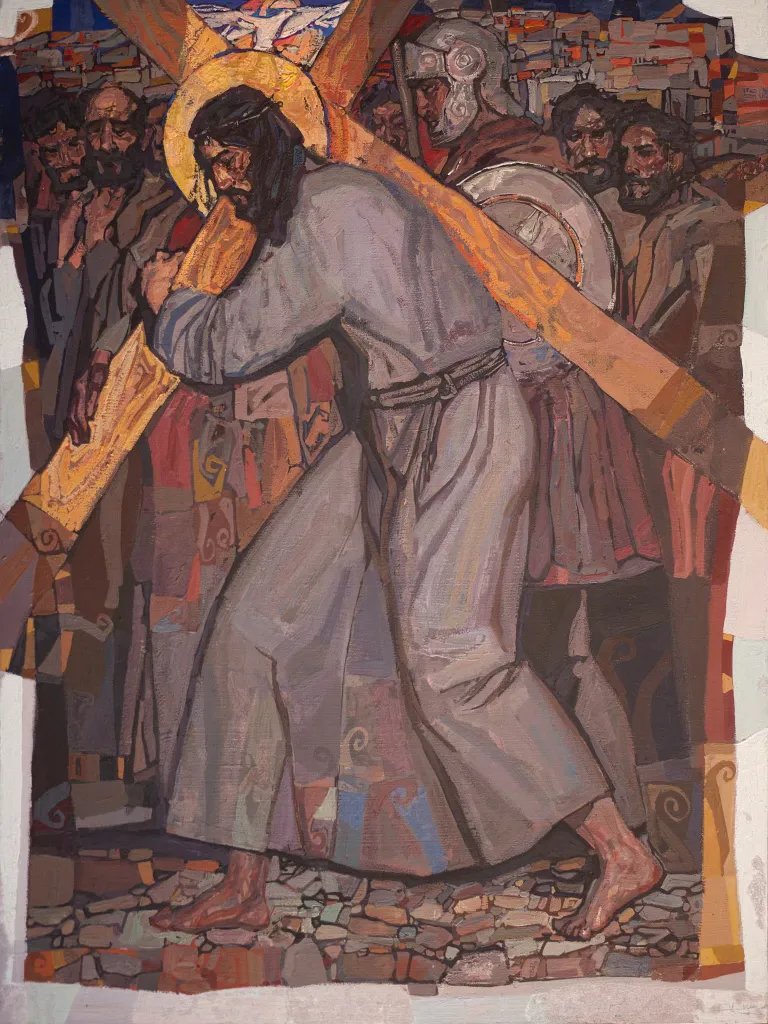He was Despised and Rejected
Consider the many people about whom we just read in the Passion narrative:
Simon the leper, the unclean man into whose home the Divine Physician came to share a meal, an outcast sought out by the Lord.
The unnamed woman whom the Lord Jesus says will be praised until the Last Day for her extraordinary act of love in using a luxurious perfumed oil to honor him, a gesture of devotion that he himself regarded as a preparation for his coming death.
The miserly crowd who are self-righteously indignant that so much money should be wasted in such a way and think that their lack of generosity is virtue.
Judas Iscariot, a man chosen by the Messiah to be one of the Twelve foundation stones of the new Israel, the Church, but who now betrays Jesus to his enemies. For money.
The unnamed man whose home included a large second story room in which the Passover of Israel became the Eucharist of the Church at the Lord’s Last Supper. There are many ways to serve the Lord, even as a gracious host.
Peter and all the other Apostles who pound their chests proudly and boast that they will die with Jesus rather than betray him.
Peter, James, and John who witnessed the divine glory of the Lord Jesus on Mount Tabor and wanted to remain there with him forever but who now can’t stay awake with him for one hour in his agony about which he warned them on the mountain.
Judas, again, who betrays Jesus with a kiss and later hangs himself in despair.
The rabble of armed guards who arrest Jesus and try to do the same to the Apostles.
The Apostles who, rather than share the passion of the Lord Jesus, now run away in terror to save themselves as their first act of collegiality.
The young man who slips away from his captors by wiggling out of his clothes and running away naked, an unnamed disciple whom some believe to be none other than the Evangelist Mark, the writer of this morning’s text.
The impetuous man in the crowd who tries to defend Jesus but manages only to cut off the ear of the High Priest’s servant.
The priests and elders, scribes and Pharisees who want to murder Jesus, men who have spent their entire lives studying the Word of God but who because of their pride and vanity cannot see the Word made flesh when now he stands before them.
The false witnesses who lie to silence a hated and inconvenient voice, even if an innocent man must die.
The insolent men, filled with contempt, who spit on Jesus and strike him after blindfolding him just to prove their pitiful power to themselves.
The maid who wants to see Peter suffer along with Jesus and taunts him with accusations until Peter fulfills the word of Jesus and denies him three times.
Peter, again, who realizes the truth of his cowardice and betrayal and then weeps bitterly at the knowledge of his sinful failure.
Many of the great crowd who on Sunday afternoon shouted “Hosanna to the Son of David” and who now on Friday morning shout “Crucify him!”
Pontius Pilate, the pagan Roman politician, who knows that Jesus is an innocent man but who nonetheless condemns him to death to placate the mob and avoid a riot in Jerusalem which would damage his career.
Barabbas, the murderer and anarchist, who is chosen by the mob to receive freedom in place of Jesus. His very name - Bar Abba, meaning Son of the Father - is a mockery of God the Father’s only begotten Son.
The common soldiers who inflict every possible indignity and brutality upon their captive because they delight in causing humiliation and pain to others.
Simon the Cyrenian, an innocent bystander who is picked out of the crowd and forced to help Jesus carry his cross.
The two thieves who are crucified alongside the Savior of the world, the guilty dying with the innocent.
The hate-filled mob who even at the foot of the Cross hurl insults at the Way, the Truth, and the Life. With their taunting words, they mock and revile the eternal Word by whom they were made.
The Roman centurion, a pagan Gentile, who having witnessed all of this stands in awe and wonder and declares at the end, “Truly this man was the Son of God.”
Joseph of Arimathea, a member of the Sanhedrin and a secret disciple of Christ, who risks everything to provide a dignified burial for the Lord Jesus. He wraps the Body of Christ in a linen shroud and lays him in a new sepulchre, an abode of the dead which from Friday afternoon to Sunday morning holds the Lord of life.
And finally the grieving women from Galilee, who had been with Jesus from the beginning and who remained with him even when the fearful Apostles ran away. These faithful women sit at the foot of the Cross, and after Jesus dies, they cannot bear to leave his tomb.
Surely the entire human condition is found in this cast of characters. But here is the question for each of us: In this mournful narrative of the Passion of Jesus Christ and the cost of world’s salvation, where am I?
This is the text of my homily for 24 March 2024, Palm Sunday of the Passion of the Lord.
Fr Jay Scott Newman

